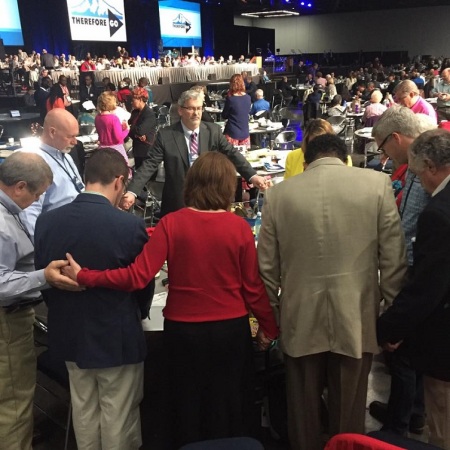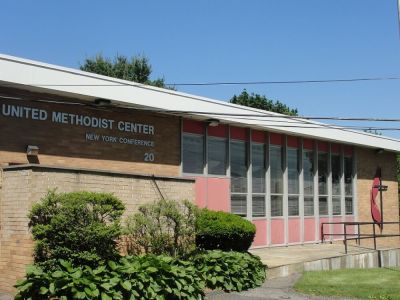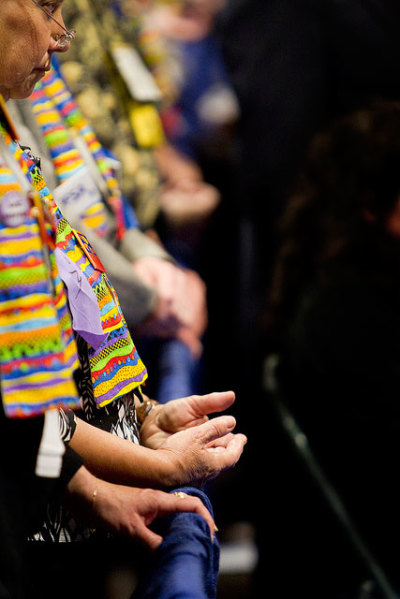UMC Regional Bodies Deny Breaking Rules by Accepting Openly Gay Clergy

Regional bodies of the United Methodist Church do not believe they are violating denominational rules on ordination by no longer questioning clergy candidates on matters of their sexual orientation or gender identity.
As part of the divisive debate over homosexuality within the UMC, some regional bodies, or Annual Conferences, have had their Boards of Ordained Ministry waive the consideration of a clergy candidate's sexual orientation.
Earlier this month, the Northern Illinois Annual Conference adopted such a statement following a scheduled meeting of their Board of Ordained Ministry.
The Rev. John Bell, chair of the Northern Illinois BOOM, told The Christian Post that they wanted to follow the example of other Annual Conferences.

"The policy was developed in response to similar policies being adopted by other Boards of Ordained Ministry in the Baltimore-Washington, New York and Pacific-Northwest Annual Conferences," explained Bell.
"We support their efforts on this issue and the efforts of those who are seeking to be ordained in the Northern Illinois Conference."
Bell told CP that the new policy "does not violate the Book of Discipline" and was "simply stating publicly what already has been our practice for some years."
"It is a practice that has served our conference well. The Board of Ordained Ministry is to consider the faith, character, call, gifts and fruitfulness of all candidates for ordination," continued Bell.
"We discern each candidate based on their fitness for ministry. Sexual orientation and identity is not part of the evaluation by the Board of Ordained Ministry."
Charles A. Parker, chair of the Baltimore-Washington Annual Conference BOOM, likewise told CP that he did not believe their policy on LGBT ordination inclusion violated the UMC's central rule book.
"We believe that our policy walks a narrow line of allowing us to do the right thing, while staying within the bounds of the Book of Discipline," said Parker.
"So those who believe that our Church needs to change its restrictive language on LGBTQ people, but who are still committed to obeying the Book of Discipline, should be free to vote their consciences."
According to the UMC Book of Discipline rules on ordination, individuals in same-sex relationships cannot become clergy.
"While persons set apart by the Church for ordained ministry are subject to all the frailties of the human condition and the pressures of society, they are required to maintain the highest standards of holy living in the world," reads the Book of Discipline.
"The practice of homosexuality is incompatible with Christian teaching. Therefore self-avowed practicing homosexuals are not to be certified as candidates, ordained as ministers, or appointed to serve in The United Methodist Church."
In a footnote, the Book of Discipline defines the phrase "self-avowed practicing homosexuals" as being "a person [who] openly acknowledges to a bishop, district superintendent, district committee of ordained ministry, board of ordained ministry, or clergy session that the person is a practicing homosexual."

For years, theological liberals within the UMC have lobbied to have the language removed and to allow for clergy to be in same-sex relationships.
Parker of the Baltimore-Washington Conference explained to CP that his Annual Conference wanted to publicly affirm past practices in light of the general trend of American society.
"Boards of Ordained Ministry have approved LGBTQ candidates for decades, but have done so under an informal 'don't ask, don't tell' policy," explained Parker.
"With same-gender marriage now the law of the land, it felt like an appropriate time for our board to have honest and open conversation about the candidates who are coming before us."
Despite the passionate advocacy for changing the rules on homosexuality within the UMC, efforts to do so have regularly failed at the denomination's quadrennial General Conference meeting.
At the recently completed 2016 General Conference held in Portland, Oregon, delegates approved a recommendation by the Council of Bishops that called for a moratorium on human sexuality petitions until a committee could effectively review the Book of Discipline's stated positions on the issue.
"We recommend that the General Conference defer all votes on human sexuality and refer this entire subject to a special commission, named by the Council of Bishops, to develop a complete examination and possible revision of every paragraph in our Book of Discipline regarding human sexuality," read the recommendation.
"We will name such a commission to include persons from every region of our UMC, and will include representation from differing perspectives on the debate. We commit to maintain an on-going dialogue with this commission as they do their work, including clear objectives and outcomes."
The Rev. Thomas Lambrecht, vice-president and general manager of the theologically conservative UMC group Good News, told CP that actions like those taken by the Northern Illinois Conference are leading the denomination to schism.
"Their decision to circumvent or ignore the requirements of our Book of Discipline is schismatic and divisive, undermining our common way of being Church together," said Lambrecht.
"For the board to arrogate to itself the right to disregard our discipline takes us one step closer to formal separation. It is in fact a recognition that the various groups in our Church can no longer live together in submission to our agreed-upon covenant."
Regarding possible punishments for BOOMs like Northern Illinois and Baltimore-Washington, Lambrecht told CP that the only way is "for the bishop to remove the members from their positions on the board."
"Any ministerial candidates who are self-avowed practicing homosexuals will now face the brunt of any disciplinary action," continued Lambrecht.
"Rather than helping such persons gain an avenue to ordained ministry, the board's action exposes them to the possibility of complaints and trials, all because the board refuses to do its work with integrity."






















